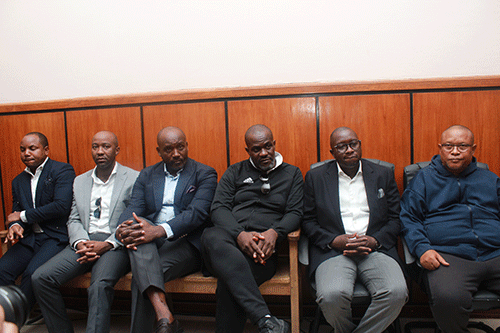The South African government is trying to trace the whereabouts of lawyer Marén de Klerk, one of the key figures in the Fishrot scandal, after receiving an extradition request from Namibia on 15 October last year.
On Monday, the South African justice ministry confirmed the request and indicated a warrant of arrest has been issued against De Klerk.
“The Office of the Prosecutor General in Namibia is requesting the extradition of Mr De Klerk from South Africa to the Republic of Namibia to stand trial on charges of racketeering, conspiracy to commit an offence, fraud, theft, money laundering and acquisition, possession or use of proceeds of unlawful activities.
“The request was forwarded to Interpol and the NPA for execution. Interpol applied for a warrant of arrest; his current whereabouts are being tracked by the investigating officer,” said justice spokesperson Chrispin Phiri.
In a July 2020 bail application hearing, lawyer Richard Metcalfe notified the court that De Klerk is in a psychiatric institution in South Africa, as it appears he has developed ‘mental problems’.
De Klerk was fingered as a central figure in the sprawling corruption scandal by then ACC senior investigator Karl Cloete during testimony in July 2020 in the bail hearing of former fisheries minister Bernhardt Esau and his son-in-law Tamson ‘Fitty’ Hatuikulipi in the Windhoek Magistrate’s Court.
According to Cloete, De Klerk had admitted in his affidavit he was part of a conspiracy to commit fraud.
Cloete informed the court they obtained De Klerk’s affidavit and various documents from his lawyers.
De Klerk was a partner in the law firm De Klerk, Horn & Coetzee Inc., where N$75.6 million was transferred from Fishcor between August 2014 to December 2019.
De Klerk, Horn & Coetzee Inc. then used Celax Investment Number One to distribute the money to individuals and entities.
De Klerk is the only shareholder in Celax Investment Number One.
The lawyer, who refers to himself as the ‘paymaster’ in the Fishrot scheme, has been residing in South Africa since February 2020, three months after former ministers Bernhard Esau and Sacky Shanghala, were arrested.
The group also includes James Hatuikulipi, Tamson Hatuikulipi, Ricardo Gustavo, Pius Mwatelulo, Nigel van Wyk, Otneel Nandetonga Shuudifonya and Phillipus Mwapopi.
Extradition was also requested in relation to Icelandic executives Ingvar Júlíusson, Egill Helgi Árnason and Adalsteinn Helgason, who worked for Samherji, an Icelandic seafood company that is accused of bribing Namibian politicians and their cronies in transactions worth more than N$3 billion to access fishing quotas.
However, according to court documents, Icelandic authorities on 19 February 2021 refused the request, citing Icelandic laws do not permit the extradition of their citizens.
Furthermore, there is no extradition agreement between the two countries.
The group is expected to stand trial on charges ranging from theft to racketeering, fraud, bribery, corruptly using the office for gratification, accepting gratification, money laundering, tax evasion and conspiring to commit corruption.
The prosecution is alleging the Samherji directors corruptly paid at least N$103.6 million in bribes to Esau and his co-accused so they can get a competitive advantage in securing horse mackerel quotas in Namibia.
This allegedly took place between 2014 and 2019.
The group’s next pretrial hearing in the matter is scheduled to take place in the Windhoek High Court on 21 September.
– mamakali@nepc.com.na



